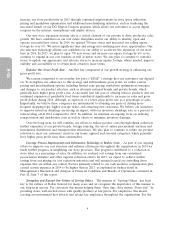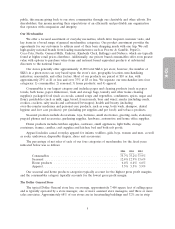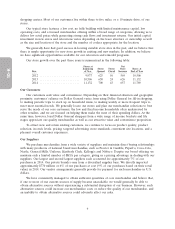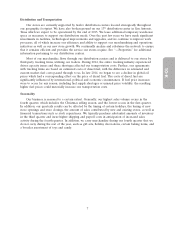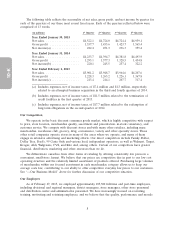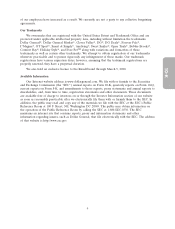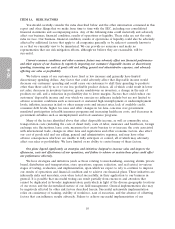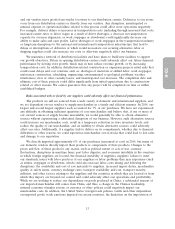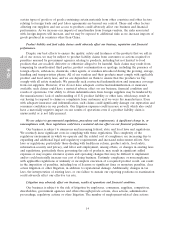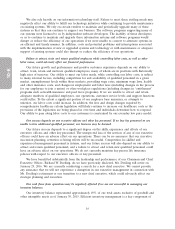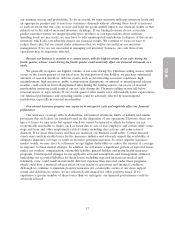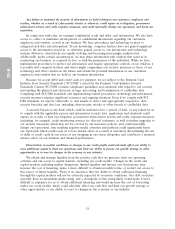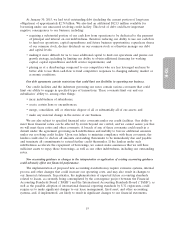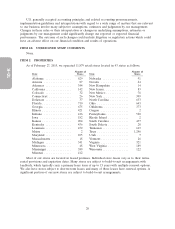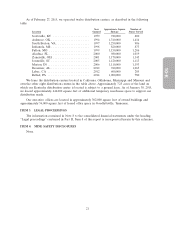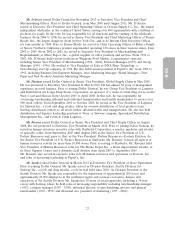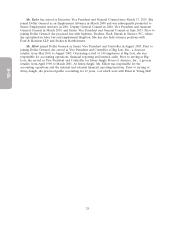Dollar General 2014 Annual Report Download - page 88
Download and view the complete annual report
Please find page 88 of the 2014 Dollar General annual report below. You can navigate through the pages in the report by either clicking on the pages listed below, or by using the keyword search tool below to find specific information within the annual report.
10-K
certain types of goods or of goods containing certain materials from other countries and other factors
relating to foreign trade and port labor agreements are beyond our control. These and other factors
affecting our suppliers and our access to products could adversely affect our business and financial
performance. As we increase our imports of merchandise from foreign vendors, the risks associated
with foreign imports will increase, and we may be exposed to additional risks as we increase imports of
goods produced in countries other than China.
Product liability and food safety claims could adversely affect our business, reputation and financial
performance.
Despite our best efforts to ensure the quality, safety and freshness of the products that we sell in
all of our stores, we may be subject to product liability claims from customers or actions required or
penalties assessed by government agencies relating to products, including but not limited to food
products that are recalled, defective or otherwise alleged to be harmful. Such claims may result from
tampering by unauthorized third parties, product contamination or spoilage, including the presence of
foreign objects, substances, chemicals, other agents, or residues introduced during the growing, storage,
handling and transportation phases. All of our vendors and their products must comply with applicable
product and food safety laws, and we are dependent on them to ensure that the products we buy
comply with all safety standards. We generally seek contractual indemnification and insurance coverage
from our suppliers. However, if we do not have adequate contractual indemnification or insurance
available, such claims could have a material adverse effect on our business, financial condition and
results of operations. Our ability to obtain indemnification from foreign suppliers may be hindered by
the manufacturers’ lack of understanding of U.S. product liability or other laws, which may result in
our having to respond to claims or complaints from customers as if we were the manufacturer. Even
with adequate insurance and indemnification, such claims could significantly damage our reputation and
consumer confidence in our products. Our litigation expenses could increase as well, which also could
have a materially negative impact on our results of operations even if a product liability claim is
unsuccessful or is not fully pursued.
We are subject to governmental regulations, procedures and requirements. A significant change in, or
noncompliance with, these regulations could have a material adverse effect on our financial performance.
Our business is subject to numerous and increasing federal, state and local laws and regulations.
We routinely incur significant costs in complying with these regulations. The complexity of the
regulatory environment in which we operate and the related cost of compliance are increasing due to
expanding and additional legal and regulatory requirements and increased enforcement efforts. New
laws or regulations, particularly those dealing with healthcare reform, product safety, food safety,
information security and privacy, and labor and employment, among others, or changes in existing laws
and regulations, particularly those governing the sale of products, may result in significant added
expenses or may require extensive system and operating changes that may be difficult to implement
and/or could materially increase our cost of doing business. Untimely compliance or noncompliance
with applicable regulations or untimely or incomplete execution of a required product recall, can result
in the imposition of penalties, including loss of licenses or significant fines or monetary penalties, class
action litigation or other litigation, in addition to reputational damage. Additionally, changes in tax
laws, the interpretation of existing laws, or our failure to sustain our reporting positions on examination
could adversely affect our effective tax rate.
Litigation may adversely affect our business, results of operations and financial condition.
Our business is subject to the risk of litigation by employees, consumers, suppliers, competitors,
shareholders, government agencies and others through private actions, class actions, administrative
proceedings, regulatory actions or other litigation. The number of employment-related class actions
14


